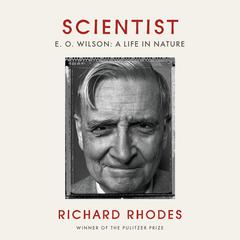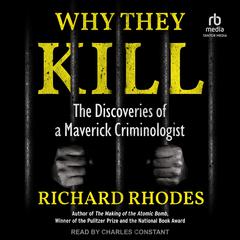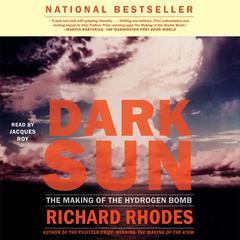 Play Audiobook Sample
Play Audiobook Sample
Dark Sun (Abridged): The Making of the Hydrogen Bomb Audiobook
 Play Audiobook Sample
Play Audiobook Sample
Quick Stats About this Audiobook
Total Audiobook Chapters:
Longest Chapter Length:
Shortest Chapter Length:
Average Chapter Length:
Audiobooks by this Author:
Publisher Description
The author of The Making of the Atomic Bomb lays bare the secret heart of the Cold War.
Richard Rhodes' landmark history of the atomic bomb won the Pulitzer Prize, the National Book Award and the National Book Award and the National Book Critics Circle Award. Now, in this majestic new masterpiece of history, science, and politics, he tells for the first time the secret story of how and why the hydrogen bomb was made, and traces the path by which this supreme artifact of twentieth-century technology became the defining issue of the Cold War.
From the day in 1941 when the first word of Anglo-American atomic-bomb research arrived in Moscow to the week of the 1962 Cuban missile crisis, Dark Sun is full of unexpected -- and sometimes hair-raising -- revelations based on previously undisclosed Soviet and U.S. sources, including:
How the Soviets were able to produce a carbon copy of the first U.S. atomic bomb
How the SAC fought for independent control of U.S. nuclear weapons -- while flying deliberately provocative daytime missions over Soviet cities
How the first and only direct nuclear confrontation between the superpowers was also very nearly the last
Following the lives of the atomic scientists on both sides of the Iron Curtain, Dark Sun is the definitive work on the hydrogen bomb, showing why the world wars that devastated the first half of the century can never happen again.
Download and start listening now!
"Years ago I'd read and enjoyed Rhodes's earlier The Making of the Atomic Bomb. Because that was a history of atomic research, the Manhattan Project, and the resulting bombings of Hiroshima and Nagasaki, I'd expected Dark Sun to be a history in a similar style. It's partly that; the record of how thermonuclear theory was developed into a weapon is only a piece of the huge story he tells. Dark Sun, continuing the history of nuclear arms begun with The Making of the Atomic Bomb, includes 2 important facets of the nuclear arms story: espionage and Soviet nuclear arms research. Large portions of the book are devoted to detailing how the Soviet Union obtained atomic weapons technology from persons within the Manhattan Project and how they'd begun their own development by the end of the war. The story of how they acquired that knowledge as well as the stories of the individuals responsible for the espionage makes for fascinating reading. Also a necessary part of the history is the evolution of Soviet nuclear weapons and testing. There are many surfaces to these complicated events, but Rhodes's grasp of them seems sure, from the political maneuverings of high-powered intellectuals within the scientific community to a history of the Cold War and the arms race to well-honed portraits of the major players involved at all levels. Because the chapters dealing with nuclear theory, bomb design, and fission were over my head, I was grateful they aren't the bulk of the book; I struggled with understanding in ways I didn't remember from my reading The Making of the Atomic Bomb. The most fascinating chapters of the book--the accounts of espionage and the Soviet research and development--aren't technical at all, and they make for gripping reading. For me, Rhodes covers the Cold War and arms race and the many tensions and scares resulting from them too briefly. But, as I say, it's a huge book as it is. I was surprised by many things: at how extensive Soviet atomic research was before the end of the war, for instance, and at how single-mindedly Curtis LeMay and the men around him tried to effect a preemptive war with the Soviets, and at how destructive thermonuclear weapons themselves are. I thought I knew, but I didn't. Good book."
— James (4 out of 5 stars)
Quotes
-
“A brilliantly rich and vivid account of the Cold War.”
— New York Times Book Review -
“A dark tale told with gripping intensity.”
— Washington Post Book World -
“An engrossing history of the scientific discoveries, political maneuverings, and cold-war espionage leading to the creation of mankind’s most destructive weapon.”
— Amazon.com, editorial review -
“This meticulously documented treatise presents a gripping story as it provides parallel coverage of U.S. and Russian efforts to create the hydrogen bomb, resulting in the nuclear arms race.”
— Library Journal -
“Rhodes delivers a megaton of science, postwar politics, espionage, and moral drama.”
— Booklist
Awards
-
A New York Times bestseller
-
Finalist for the 1996 Pulitzer Prize for History
Dark Sun Listener Reviews
-
" A nice balance of technology, biography, and politics. And a good reality check on what nuclear stockpiles really entail for society. "
— Bob C, 11/15/2020 -
" The exquisite companion to The Making of the Atomic Bomb. Read it if only for the chapters on nuclear physics. "
— C, 2/17/2014 -
" A very interesting book, but may have a narrower appeal than Rhodes` first book on the bomb. Rhodes tells you everything you might not have wanted to know about Teller, the rather creepy "father of the Hydrogen Bomb." "
— Jack, 2/14/2014 -
" A well written, well researched summary of the Soviet efforts toward the A-bomb (including an excruciatingly-detailed review of the Soviet spying activities in the US) and the US and Soviet efforts towards the H-bomb. "
— Dmitry, 1/20/2014 -
" Dark Sun: The Making of the Hydrogen Bomb covers more than the title suggests. The narrative begins with Soviet espionage in the 1940s, coving such figures as the physicist Klaus Fuchs, the courier Harry Gold, David Greenglass the enlisted man at Los Alamos, and the Rosenbergs. These figures and others provided the Soviets with a good deal of information about the atomic bomb program, in particular the existence of plutonium and the use of implosion to create a plutonium bomb (as opposed to a bomb made from Uranium 235). Rhodes' discussion of Soviet espinoage is incomplete, for two reasons. First, when the book was published in 1995, much less material was available on the American Venona project to decrypt Soviet messages that were first coded and then enciphered with a one time pad (the one time pads were in fact used more than once, which was what allowed the Americans to decrypt many but not all messages or portions there of). This material extends our knowledge of Soviet espionage. Second, there was at least one more physicist at Los Alamos who was a Soviet spy. As I recall, the more recent book on the subject of nuclear weapons, The First War of Physics has more material on these matters. Rhodes' book is still valuable, because it has more material on the technical issues, as well as being wonderfully written. The material on fission bombs (like those dropped on Japan) is important because a fission bomb is needed to trigger fusion in a hydrogen bomb. Hydrogen bombs can be made much more powerful than a fission only bomb. Rhodes covers both the American and Soviet programs. To me, it seems likely that the Soviets would have eventually learned all they needed to on their own without spying, but that espionage speeded their work up considerably. They probably also learned about early (middle of the 1940s) ideas on how to design a fusion weapon. Edward Teller had been working on a fusion weapon since the 1940s. As Teller became fixated on an unworkable idea to make a hydrogen bomb, this particular variant known as the Super, and remained fixated on it until 1949 or 1950, the ironic circumstance arose that the primary advocate of a fusion weapon probably helped slow its development. A different idea of Teller's, which was also developed by the Soviets for their first thermonuclear device, known as the Alarm Clock, could have been developed some years before the United States first exploded a thermonuclear device in the autumn of 1952, but would have resulted in a much smaller (and thus to Teller unsatisfactory) explosion. In the early 1950s the collaboration between Edward Teller and the mathematician Stanislaw Ulam lead to a workable design for a multi-megaton hydrogen bomb. One interesting aspect of hydrogen bomb development was that it was impossible to meaningfully test any of its components separately to see if it would work. This aspect made it different from the fission bomb, where some experimental tests could be done without a tremendous explosion occurring (which doesn't mean that these tests weren't scary). As a consequence of this limitation, the hydrogen bomb was much more dependent upon numerical simulations to test and improve designs, prior to testing the bomb by exploding one. These simulations were very difficult for a staff using mechanical calculating machines and slide rules, and some could only be done using early electronic computers. As the computers were just being built at the time, the American development of the hydrogen bomb was sometimes delayed by the need to wait for the computer to be built. Rhodes' also covers the deployment of the American strategic bomber command which would use the bombs. Curtis LeMay was the most important commander of this Air Force unit in the 1940s and 1950s. LeMay was a very able commander who prepared his unit well. He also had some views that to me seem way to close to advocating preemptive nuclear war. He continued to advocate similar views when he was the chief of staff of the Air Force during the Cuban Missile Crisis. During much of this period, in the United States there was a perception that the Soviet Union was quickly overtaking the United States in its nuclear capabilities. Sufficient evidence of successful Soviet espionage had come out in various trials (the Rosenbergs and Fuchs trials for example) that many people were quite jumpy. In addition, Edward Teller was unhappy with the rate at which the United States was developing a hydrogen bomb. These aspects converge in the administrative hearing regarding whether or not Robert Oppenheimer, the first head of the American nuclear weapons laboratory at Los Alamos and a government advisor in the 1940s and early 1950s, should continue to have a security clearance. Oppenheimer was vulnerable in general terms because both his wife and brother Frank had been members of the Communist Party. He himself had been a fellow traveler. More specifically damaging, he had been approached to provide information to the Soviets about the atomic bomb program in the 1940s, and had told two different and contradictory stories about it to government officials. He does not seem to have been a spy, though I don't know what the Venona materials might indicate about this matter. These contacts were old news by the time of his hearing, but the context had changed and also Teller had come to blame Robert Oppenheimer for the lack of progress on the hydrogen bomb (though by the time the hearing occurred a thermonuclear device had alread been tested in the Pacific). Oppenheimer lost his clearance, and Teller lost the goodwill of many of his colleagues for his testimony during the hearing. "
— Converse, 1/14/2014 -
" So this was most certainly a worthwhile read, although nowhere near the same class as "The Making of the Atomic Bomb" (which I think every scientist and most want-to-be-educated people should read). The descriptions of the science and technology wasn't nearly as thorough as TMotAB (although that could be because most of the info is still highly classified), but the discussion of the politics, and the personalities were very well done. A fascinating topic in general, and one that makes me very very glad that the cold war is over.... "
— Scott, 1/10/2014 -
" This is no "The Making of the Atomic Bomb". "
— Nick, 1/9/2014 -
" incredible, one of those books the reading of which is a long, but wonderful journey "
— Chris, 1/8/2014 -
" I've been taking my time getting through this one. Less of a page turner than it's predecessor, but interesting history. "
— Erik, 12/29/2013 -
" Good book. Not as good as the preceding "The making of the atomic bomb" but still well worth a read. Focusses more on the politics than the previous book, and does not have the same gripping narrative, but still full of interesting information. "
— Dan, 12/21/2013 -
" A gripping story and a great read after the Making of the Atomic bomb. Would have loved a more scientific approach to the bomb building (as in the predecessor) but the espionage and cold war approach was interesting nonetheless. "
— Olli, 12/13/2013 -
" There sure was a lot of spying that went on with a nuclear bomb. Lots of physics too. Kinda slow, but lots to learn here. "
— Myke, 12/13/2013 -
" Good - but too much like Atomic Bomb. After reading Atomic bomb and picking this book up, it was tiring. If you only read one of Rhodes stick with Atomic Bomb. "
— Robert, 9/3/2013 -
" Sexy book about bombs. "
— Antiloquax, 8/10/2013 -
" A tough slog at times since it starts before the prequel but eventually it makes it through the fission effort and onto fusion history. An authoritative work. "
— Mike, 6/9/2013 -
" follow-up to his making of the atomic bomb book - picks up where it left off and discussed the birth of the H bomb and the simultaneous rise of the red scare "
— Kevin, 3/12/2013 -
" Not quite as compelling as its precurson on the making of the Atomic Bomb, this book nonetheless does a fantastic job of explaining the advent of the thermonuclear age, just a few decades into the nuclear age, and setting the stage for playout of the entire cold war. "
— Kevin, 6/24/2012 -
" This one was really good. It also had quite a lot of scientific and technical discussion which was interesting. "
— Jani-Petri, 5/10/2012 -
" Learned alot about how efficient the Russian spy network was in the late '40's & early '50's. Also how ruthless Stalin & the KGB were. "
— Beth/Chuck, 3/17/2012 -
" A very depressing sequel to the best book I ever read. "
— Larry, 2/16/2012 -
" About half the book is about Soviet espionage. There's fare less about the science than the Making of the Atomic Bomb. Still a hell of a read. "
— Noladishu, 10/2/2011 -
" The true beginning to the arms race "
— Albert, 6/13/2011 -
" A good follow up to his first work. Not as good, but still excellent. Less physics, more background, more espionage, more personalities. Fascinating stuff. "
— James, 6/1/2011 -
" Not quite as compelling as its precurson on the making of the Atomic Bomb, this book nonetheless does a fantastic job of explaining the advent of the thermonuclear age, just a few decades into the nuclear age, and setting the stage for playout of the entire cold war. "
— Kevin, 1/3/2011 -
" incredible, one of those books the reading of which is a long, but wonderful journey "
— Chris, 7/3/2010 -
" When the A bomb just isn't enough. "
— Russ, 5/29/2010 -
" The true beginning to the arms race "
— Albert, 4/20/2009 -
" Dr. Strangelove really existed! His name was Curtis LeMay, and holy crap we're lucky to still be here. "
— John, 2/9/2009 -
" A very interesting book, but may have a narrower appeal than Rhodes` first book on the bomb. Rhodes tells you everything you might not have wanted to know about Teller, the rather creepy "father of the Hydrogen Bomb." "
— Jack, 2/6/2009 -
" A tough slog at times since it starts before the prequel but eventually it makes it through the fission effort and onto fusion history. An authoritative work. "
— Mike, 9/15/2008
About Richard Rhodes
Richard Rhodes is the author of twenty-six books including The Making of the Atomic Bomb, which won the Pulitzer Prize in Nonfiction, the National Book Award, and the National Book Critics Circle Award. He graduated from Yale University and has received fellowships from the Ford Foundation, the National Endowment for the Arts, the John Simon Guggenheim Memorial Foundation, and the Alfred P. Sloan Foundation. He has been a visiting scholar at Harvard, MIT, and Stanford and a host and correspondent for documentaries on American public television.


































